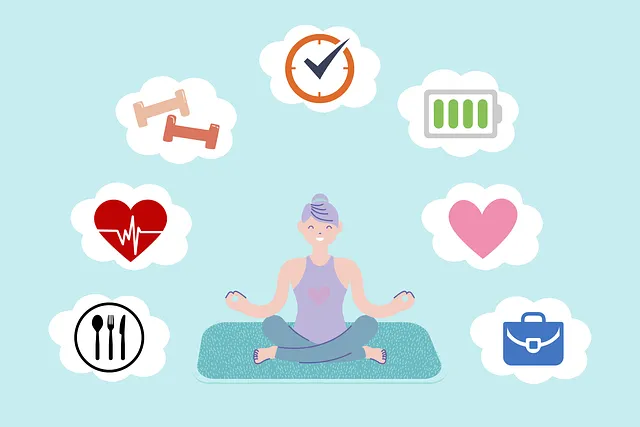The Centennial Kaiser Permanente mental health access center provides comprehensive anxiety management using evidence-based approaches like CBT and mindfulness. They focus on symptoms, triggers, and holistic practices for stress reduction through self-reflection, lifestyle changes, and cultural sensitivity. Their dedicated team offers personalized care, crisis intervention, and community outreach to empower individuals with tools for improved emotional well-being.
Anxiety disorders are a common challenge, affecting millions worldwide. This article guides you through effective anxiety management techniques, offering insights into understanding and addressing this condition. We explore cognitive behavioral therapy (CBT), mindfulness practices, lifestyle adjustments, and the crucial role of professional support from organizations like Centennial Kaiser Permanente Mental Health Access Center. By incorporating these strategies, individuals can take control of their mental wellbeing and lead more fulfilling lives.
- Understanding Anxiety Disorders and Their Triggers
- Cognitive Behavioral Therapy: A Step-by-Step Guide
- Mindfulness and Meditation Techniques for Calmness
- Lifestyle Changes for Enhanced Mental Wellbeing
- Professional Support: Kaiser Permanente's Role
Understanding Anxiety Disorders and Their Triggers

Anxiety disorders are prevalent mental health issues that affect millions worldwide. Understanding these disorders and their triggers is a crucial step in managing anxiety effectively. The Centennial Kaiser Permanente Mental Health Access Center emphasizes the importance of recognizing symptoms and identifying personal triggers to foster resilience building. Common anxiety disorders include generalized anxiety disorder (GAD), panic attacks, social anxiety, and phobias, each with unique manifestations and underlying causes.
At the core of anxiety management is developing communication strategies that promote open dialogue about fears and concerns. The center advocates for culturally sensitive mental healthcare practices, ensuring individuals from diverse backgrounds feel heard and understood. By combining these approaches, such as encouraging self-reflection, practicing mindfulness, and implementing evidence-based techniques, people can better navigate their anxiety disorders and lead more fulfilling lives.
Cognitive Behavioral Therapy: A Step-by-Step Guide

Cognitive Behavioral Therapy (CBT) is a structured approach to anxiety management that focuses on identifying and changing negative thought patterns and behaviors. Offered at the Centennial Kaiser Permanente Mental Health Access Center, CBT involves a collaborative process between therapist and client, working together to challenge unhelpful beliefs and replace them with more realistic and positive ones.
This step-by-step guide begins with assessing your current thoughts, feelings, and behaviors related to anxiety. Through journaling and discussion, you’ll gain awareness of recurring negative thought cycles. Next, the therapist will help you identify cognitive distortions, such as all-or-nothing thinking or catastrophizing. You’ll then learn coping skills for challenging these distortions and replacing them with more balanced perspectives. Over time, this process promotes emotional well-being and enhances your ability to manage anxiety in daily life, supported by evidence-based techniques and the expertise of Centennial Kaiser Permanente mental health professionals. Additionally, trauma support services may be integrated into CBT if past traumatic experiences contribute to current anxiety.
Mindfulness and Meditation Techniques for Calmness

Anxiety can be effectively managed through mindfulness and meditation techniques that foster calmness. At the Centennial Kaiser Permanente mental health access center, professionals emphasize the power of focusing on the present moment to reduce stress levels. Mindfulness involves paying attention to one’s thoughts and feelings without judgment, helping individuals recognize and accept their emotions as they are. This practice can be enhanced through meditation, which encourages a state of relaxation and clarity by training the mind to concentrate on specific objects or thoughts.
By incorporating these mindfulness and meditation techniques into daily routines, individuals can significantly improve their mental well-being. The Mind Over Matter principles taught at the access center help people understand that they have control over their thoughts and emotions, thereby reducing anxiety symptoms. Additionally, empathy building strategies, which promote understanding and compassion towards oneself and others, play a crucial role in preventing burnout and fostering resilience. These holistic approaches, combined with professional guidance, can transform one’s relationship with anxiety, leading to lasting calmness and improved quality of life.
Lifestyle Changes for Enhanced Mental Wellbeing

At the Centennial Kaiser Permanente mental health access center, they emphasize holistic approaches to anxiety management, recognizing that lifestyle changes play a pivotal role in enhancing overall mental wellbeing. This involves fostering healthy habits such as regular physical exercise, adequate sleep, and balanced nutrition. These foundational elements are backed by scientific research as powerful tools to mitigate anxiety symptoms and improve mood regulation.
Additionally, the center promotes social skills training and cultural sensitivity in mental healthcare practice, creating a supportive environment where individuals feel understood and empowered. Crisis intervention guidance is also readily available, providing immediate assistance during moments of heightened distress. By combining these evidence-based strategies with personalized care, Centennial Kaiser Permanente equips individuals with the tools and resilience needed to effectively manage anxiety and lead fulfilling lives.
Professional Support: Kaiser Permanente's Role

At Centennial Kaiser Permanente Mental Health Access Center, professional support plays a pivotal role in anxiety management. Our dedicated team comprises licensed therapists, psychiatrists, and psychologists who offer evidence-based treatments tailored to individual needs. We understand that everyone’s experience with anxiety is unique, so we provide a range of services from cognitive-behavioral therapy (CBT) to mindfulness practices, ensuring comprehensive care.
Kaiser Permanente’s commitment to mental health extends beyond clinical services. Our Community Outreach Program Implementation focuses on bringing awareness and support to underserved communities. Through effective Communication Strategies, we bridge the gap between patients and healthcare by promoting open dialogue and understanding. Additionally, Healthcare Provider Cultural Competency Training equips our staff with the knowledge to address diverse cultural needs, fostering an inclusive environment that respects and validates every patient’s experience.
Anxiety management is a holistic process that involves understanding, therapy, mindfulness, and lifestyle changes. By recognizing triggers and adopting evidence-based techniques like Cognitive Behavioral Therapy (CBT) and mindfulness meditation, individuals can gain control over their anxiety. Lifestyle modifications, such as regular exercise and balanced nutrition, further enhance mental wellbeing. For those in the Centennial area seeking professional support, Kaiser Permanente’s mental health access centers offer comprehensive care tailored to individual needs. With these strategies and resources, managing anxiety becomes a feasible journey towards a calmer, healthier mind.






